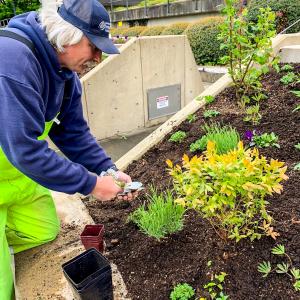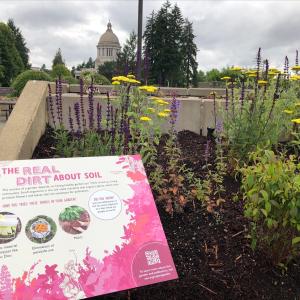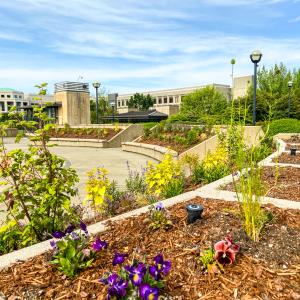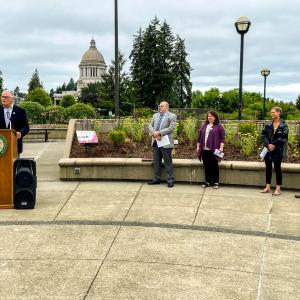Have you Heard the Buzz? New Pollinator Garden unveiled at Washington State Capitol
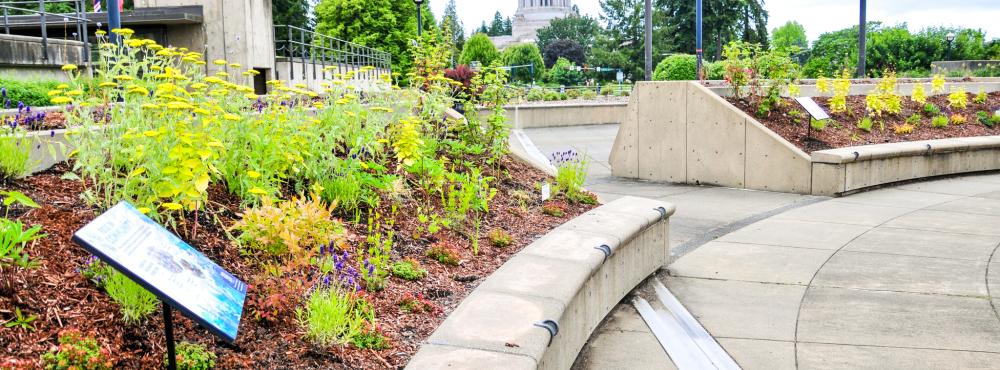
Garden created by multi-organization partnership
Garden images are available for download on Flickr.
See the news conference on TVW.
OLYMPIA—A new pollinator garden to support thriving butterflies, bees and birds was unveiled today at the Washington State Capitol Campus in Olympia.
The garden was created in partnership between the Office of Governor Jay Inslee, Washington Department of Enterprise Services (DES), Washington Department of Fish and Wildlife (WDFW), Washington Department of Agriculture (WSDA), Woodland Park Zoo (WPZ), and the Xerces Society for Invertebrate Conservation.
The garden features pollinator-attracting plants to provide food, water and shelter to pollinators, and has beautiful signage that informs visitors about the critical role of pollinators and how to attract and protect them. It covers a combined space of roughly 1,000 square feet in the heart of the Capitol Campus over the 14th Ave. tunnel. The garden will provide a peaceful and quiet spot for legislators, state employees and visitors at the otherwise bustling Capitol Campus.
In recent years, scientists have documented a decline in pollinators due to habitat loss, invasive species, pesticides and climate change. While this decline is concerning, human intervention can help protect these important species, who are responsible for pollinating 85% of the world’s flowering plants, including more than two-thirds of the world’s crop species. In other words, bees, butterflies and other pollinating insect species truly feed the world. By installing pollinator gardens where they live and work, Washingtonians can help steward and conserve pollinators.
Governor Jay Inslee, an avid supporter of pollinator health along with First Spouse, Trudi Inslee, unveiled the garden today.
“Washington is the most beautiful state in the country and our pollinators are a contributor to that. They allow for diversity in our environments and are crucial to the health of those environments. Trudi and I are excited for this new pollinator garden on our Capitol Campus. Let’s inspire others to protect pollinators across the state,” said Gov. Inslee.
Funding for the garden came from the state’s supplemental budget passed by the legislature in March and signed by the Governor. The funding was allocated to DES, whose Grounds Operations Team will maintain the garden.
“We are thankful for the partnerships that made the first educational garden on the Capitol Campus possible and especially for the efforts of our Buildings & Grounds team who worked rain and shine to install the garden. I hope this new feature will be enjoyed on the campus for years to come, and that it inspires people to enjoy pollinator gardens in their own homes and businesses,” said DES Director Tara C. Smith.
WDFW facilitated the partnerships to make this garden a reality since its inception. Their pollinator and plant experts were essential collaborators in the garden’s design and signage, ensuring that key messaging around native plants and animals were highlighted.
“As a conservation agency dedicated to restoring Washington’s biodiversity, we at WDFW are proud to be a partner in this effort,” said WDFW Director Kelly Susewind. “By working with our partners, we can help protect and restore habitat, advance rare species recovery, and implement projects aimed at better understanding pollinator status in our state and this garden is a great step toward that goal.”
Woodland Park Zoo, well-known for its pollinator conservation efforts and programming, created the garden’s concept, worked with state agencies to build the garden and procure the plants, and designed the signage on display.
“Bees and butterflies are remarkable. These amazing animals are so tiny but make such an enormous impact. So many plants, flowers and trees exist because pollinators help them thrive, like Washington’s beloved apples and cherries. This garden is a reminder that by transforming our own understanding and behavior, we can create healthy habitats for these miraculous creatures,” said Woodland Park Zoo Co-Curator Erin Sullivan, who is a pollinator conservationist and entomologist.
"Bees and other pollinators are at the heart of a healthy environment and make Washington's bountiful fruit harvests possible,” said Matthew Shepherd, Director of Outreach & Education at Xerces Society for Invertebrate Conservation. “The Capitol Campus Pollinator Garden will provide inspiration for people across the state to make changes necessary to ensure that we can continue to enjoy the beauty of butterflies in our towns and the hum of bees in the prairies."
For a full list of plants found at the new Capitol Campus Pollinator Garden and information about how you can support pollinators in your own backyard, visit www.zoo.org/capitolgarden
